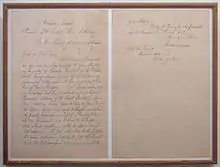Tokugawa Iemochi
Tokugawa Iemochi (徳川 家茂) (July 17, 1846 – August 29, 1866) was the 14th shōgun of the Tokugawa shogunate of Japan, who held office from 1858 to 1866.[1] During his reign there was much internal turmoil as a result of the "re-opening" of Japan to western nations. Iemochi's reign also saw a weakening of the shogunate.[1]
Tokugawa Iemochi | |
|---|---|
.jpg.webp) | |
| Shōgun | |
| In office August 14, 1858 – August 29, 1866 | |
| Monarch | Kōmei |
| Preceded by | Tokugawa Iesada |
| Succeeded by | Tokugawa Yoshinobu |
| Personal details | |
| Born | July 17, 1846 Minato, Edo, Japan |
| Died | August 29, 1866 (aged 20) Osaka Castle, Japan |
| Spouse(s) | Princess Kazu |
Iemochi died in 1866 and was buried in Zōjō-ji. His Buddhist name was Shonmyoin.
Biography
Iemochi, known in his childhood as Kikuchiyo (菊千代), was the eldest son of the 11th-generation Wakayama Domain lord Tokugawa Nariyuki (1801–1846) with his concubine known as jitsujoin and was born in the domain's residence in Edo (modern-day Minato-ku in Tokyo). Nariyuki was a younger son of the 11th shōgun, Tokugawa Ienari.
In 1847, at age 1, he was adopted as the heir of the 12th-generation daimyō Tokugawa Narikatsu, and succeeded him in 1850, taking the name Tokugawa Yoshitomi following his coming of age in 1851. In 1858 he had audience with shōgun Iesada and his wife, Atsuhime short after he was adopted as their son and named as the successor to the main Tokugawa house. The choice of Yoshitomi was not without conflict; there were other factions in the government who supported Tokugawa Yoshinobu or Matsudaira Naritami for shōgun; both of them, unlike Yoshitomi, were adults. After assuming the office of shogun, Yoshitomi changed his name to Iemochi.
Before Iesada died he give his will to Ii Naosuke, that:
- First, Ii Naosuke must help Iemochi at administration until Iemochi old enough to rule.
- Second, all political issues must be discussed with Tenshoin as Iemochi's mother.
As part of the kōbu gattai ("Union of Court and Bakufu") movement, On 11 February 1862, Iemochi married Princess Kazu, daughter of Emperor Ninko. Princess Kazu refused to use the title "Midaidokoro", and instead only used the title "Miya".
On April 22, 1863 (Bunkyū 3, 5th day of the 3rd month), shōgun Iemochi traveled in a great procession to the capital. He had been summoned by the emperor, and had 3,000 retainers as escort. This was the first time since the visit of Iemitsu in the Kan'ei era, 230 years before, that a shogun had visited Kyoto.[2]
His early death at the age of 20 put an end to his short marriage with princess Kazu-no-Miya. Before he died he adopted a son, Tayasu Kamenosuke (later known as Tokugawa Iesato), as his heir. At that time Tayasu Kamenosuke was only 3 years old, but as the Tokugawa shogunate was at war with Chōshū, Yoshinobu was appointed the fifteenth shōgun. Shōgun Yoshinobu then adopted Iemochi's adopted son, Tayasu Kamenosuke. After Iemochi's death, Kazu-no-Miya changed her name to Seikan'in no Miya. The cause of Iemochi's death is widely reported as heart failure due to beriberi, a disease caused by thiamine (vitamin B1) deficiency.
His successor, Tokugawa Yoshinobu, was the last Tokugawa shōgun and witnessed the end of the shogunate, which gave way to the Meiji Restoration.
Family
- Father: Tokugawa Nariyuki (1801–1846)
- Mother: Jitsujoin (1821–1904)
- Adoptive fathers:
- Tokugawa Narikatsu (1820–1849)
- Tokugawa Iesada
- Adoptive Mother: Tenshō-in
- Wife: Kazu-no-Miya Chikako
- Concubine:
- Oyuri no Kata (1850–1880) later Shoko-in
- Ohina no Kata (1846–1862) daughter of Shimazu Tadafuyu also niece of Tenshō-in
- Adopted son: Tokugawa Iesato
Eras of Iemochi's bakufu


The years in which Iemochi was shōgun are more specifically identified by more than one era name or nengō.
In fiction
Tokugawa Iemochi is featured in the 2008 NHK Taiga drama, Atsuhime. He is portrayed by Matsuda Shota.
His child self is featured in the novel Kazunomiya, Prisoner of Heaven, by Kathryn Lasky, a fictional diary written by Iemochi's wife.
Iemochi is also mentioned in The Last Concubine by Lesley Downer.
He is parodied in the manga and anime series Gin Tama as "Tokugawa Shige-Shige" (徳川 茂茂), where Shige is an alternative reading of the kanji 茂 in 家茂.
Lord Tokugawa appears in James Clavell's novel Gai-Jin as Nobusada Toranaga.
Notes
- "Japan:Memoirs of a Secret Empire". PBS. Retrieved 2007-08-11.
- Ponsonby-Fane, Richard. (1956). Kyoto: the Old Capital of Japan, 794–1869, p. 325.
References
- Rekishi Dokuhon Jan. 2006 issue: Tokugawa Shōgun-ke to Matsudaira Ichizoku
- Tokugawa Iemochi to sono jidai: wakaki shōgun no shōgai 徳川家茂とその時代: 若き将軍の生涯. Tokyo: Tokugawa kin'en zaidan 徳川記念財団, 2007.
- Totman, Conrad. (1980). The Collapse of the Tokugawa Bakufu, 1862–1868. Honolulu: University of Hawai'i Press. ISBN 978-0-8248-0614-9
External links
![]() Media related to Tokugawa Iemochi at Wikimedia Commons
Media related to Tokugawa Iemochi at Wikimedia Commons
- Digitized woodblock print: Shogun Iemochi in procession towards Kyoto in Bunkyū 3
| Royal titles | ||
|---|---|---|
| Preceded by Tokugawa Narikatsu |
Lord of Kishū: Tokugawa Iemochi 1858–1866 |
Succeeded by Tokugawa Mochitsugu |
| Military offices | ||
| Preceded by Tokugawa Iesada |
Shōgun: Tokugawa Iemochi 1858–1866 |
Succeeded by Tokugawa Yoshinobu |
